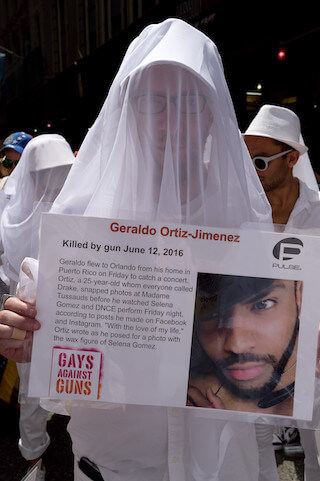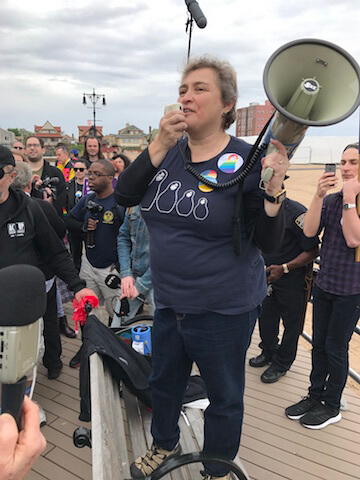While AIDS groups and activists remain focused on replacing the services that were lost when the city closed its Chelsea sexually transmitted disease clinic for a renovation, city documents obtained by Gay City News show that the start of the renovation was repeatedly delayed.
“Regardless of when the city got its act together and was able to execute a contract with the winning bidder, there should still have been a better, fleshed out plan for continuation of services,” said City Councilmember Corey Johnson, the out gay, HIV-positive Health Committee chair who represents Chelsea, among other neighborhoods. “They should have had a plan two years ago, and they should have had a better plan earlier this year.”
Using the state Freedom of Information Law, Gay City News obtained documents related to the city’s Department of Design and Construction (DDC) contract for the renovation totaling roughly 2,800 pages. The clinic is operated by the city’s health department, and DDC oversees the construction of many city properties. The records were obtained from the city comptroller’s office, which registered the contract.
Documents obtained under Freedom of Information Law show work stopped for one year, evacuation of staff required
The Chelsea clinic, which saw the most visitors in any year among the city’s nine clinics, was expected to be a central resource in the Plan to End AIDS. The plan, which aims to reduce new HIV infections in New York State from the current roughly 3,000 annually to 750 a year by 2020, will use anti-HIV drugs in HIV-negative people to keep them uninfected and in HIV-positive people so they are no longer infectious. People who visit the Chelsea clinic and have a sexually transmitted disease or a positive HIV test would be prime candidates for these drug regimens.
The records show that the design contract for the renovation was awarded to an architecture firm by 2009 and the construction drawings were completed by August 2011. DDC incorporated them into the specifications, which were date stamped “08/31/11,” for companies that would bid on the $17 million renovation contract. The specifications were updated in December 2012 to include $15,000 for removing asbestos from the clinic.
The Bloomberg administration allocated the cash for the renovation in the city’s 2013 fiscal year, which began on July 1, 2012. DDC solicited bids in March of 2013 and selected the winning bidder, Andron Construction, on May 7, 2013. The bid documents envisioned the contract paying in three equal amounts over three fiscal years. In an email, a DDC spokesperson wrote, “The initial fund allocation does not dictate final project schedule.”
The contract was finalized in January of 2014 with Andron signing four copies in DDC’s offices, and then submitted to the comptroller’s office for approval in February. The comptroller listed the contract terms as running from March of 2014 to March of 2017.
Andron began work in March of 2014, but quickly stopped after finding “additional substantial asbestos quantities and encountering difficulties of massive abatement in direct proximity to the functioning medical facility,” a DDC spokesperson wrote in an email. The documents show that DDC’s plan was always to keep the clinic open while the renovation occurred in phases. In 2014, the city health department rejected that plan.
“This decision was made exclusively by [the city health department] based on the end user’s feedback during initial construction phase (asbestos abatement),” the DDC spokesperson wrote.
According to the specifications, asbestos surveys were conducted in the 23,600 square foot clinic in 2004, 2010, and 2011. Among five areas in the clinic, the surveys found 3,440 linear feet of asbestos in “pipe insulation and associated fittings” and 14,737 square feet of other materials containing asbestos.
“The work was stopped by [the city health department] and by 04.10.15, the building was fully evacuated,” the DDC spokesperson wrote. “Asbestos abatement resumed immediately after.”
The final wrinkle was that Andron did not get paid. At the start of this year, the company wrote to the comptroller’s office complaining that it had not received any cash. A labor law lien had mistakenly been placed on the company. The lien was quickly removed, and Andron has received its first checks.
DDC is now saying that the renovation will be completed in 26 months.
“It is not going to take three years,” the DDC spokesperson wrote. “The estimated completion date will take place in Fall 2017.”
The agency, which has sent senior executives to meetings about the clinic that were organized by Johnson, has said the same thing to activists who have been pressing the de Blasio administration to fully replace the services that the Chelsea clinic provided until it reopens.
“The DDC, they have given us as much as a solid timeline as they are willing to and that is September 2017,” said Jeremiah Johnson, HIV prevention research and policy coordinator at the Treatment Action Group, an advocacy organization. “We just need services to continue now.”
While activists were initially aiming their fire over the clinic closing at the city health department, they are now also targeting Mayor Bill de Blasio. Their view is that the city never prepared for the shutdown.
“DDC told us it was only in March of 2015, with the closing, that they realized that personnel would not be able to continue to work there through the renovation,” wrote Jim Eigo, a member of ACT UP, the AIDS activist group. “I do not believe [the city health department] was prepared for a full closure of the clinic in March.”



































